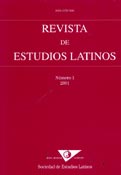The problems of chronology in Bede’s England through the Epistula ad Pleguinam
DOI:
https://doi.org/10.23808/rel.v10i0.87838Keywords:
Bede; chronology; reckoning time; epistolography.Abstract
In this study, we aim to show how a letter of Bede, the Epistula ad Pleguinam de aetatibus saeculi, serves to support the transmission of scientific knowledge as if it was a matter of theory or treatise. We will analyze the characteristics in this letter with attention to its structure and contents, because through dialog and the synthesis, obvious foundations of one letter, Bede converts it into a small chronological treatise. The chronology is the base of any great story of the world for which the monk of Jarrow utilizes the Fathers of the church as a source and developing, following its contents, the established postulate in 705 regarding De temporibus liber, in which the birth of Christ as 3952, not 5199 of the world’s era.Downloads
Download data is not yet available.
Downloads
Published
2010-12-28
How to Cite
González Marrero, J. A. and Del Mal Plaza Picón, F. (2010) “The problems of chronology in Bede’s England through the Epistula ad Pleguinam”, Revista de Estudios Latinos, 10, pp. 117–130. doi: 10.23808/rel.v10i0.87838.
Issue
Section
Articles
License
Copyright (c) 2010 Revista de Estudios Latinos

This work is licensed under a Creative Commons Attribution-NonCommercial-NoDerivatives 4.0 International License.
The originals published in the printed and electronic editions of this journal are the property of the Revista de Estudios Latinos and can be circulated as long as the original source and authorship is made clear in any reproduction, full or partial, of the same, and as long as this is not done for commercial purposes.






